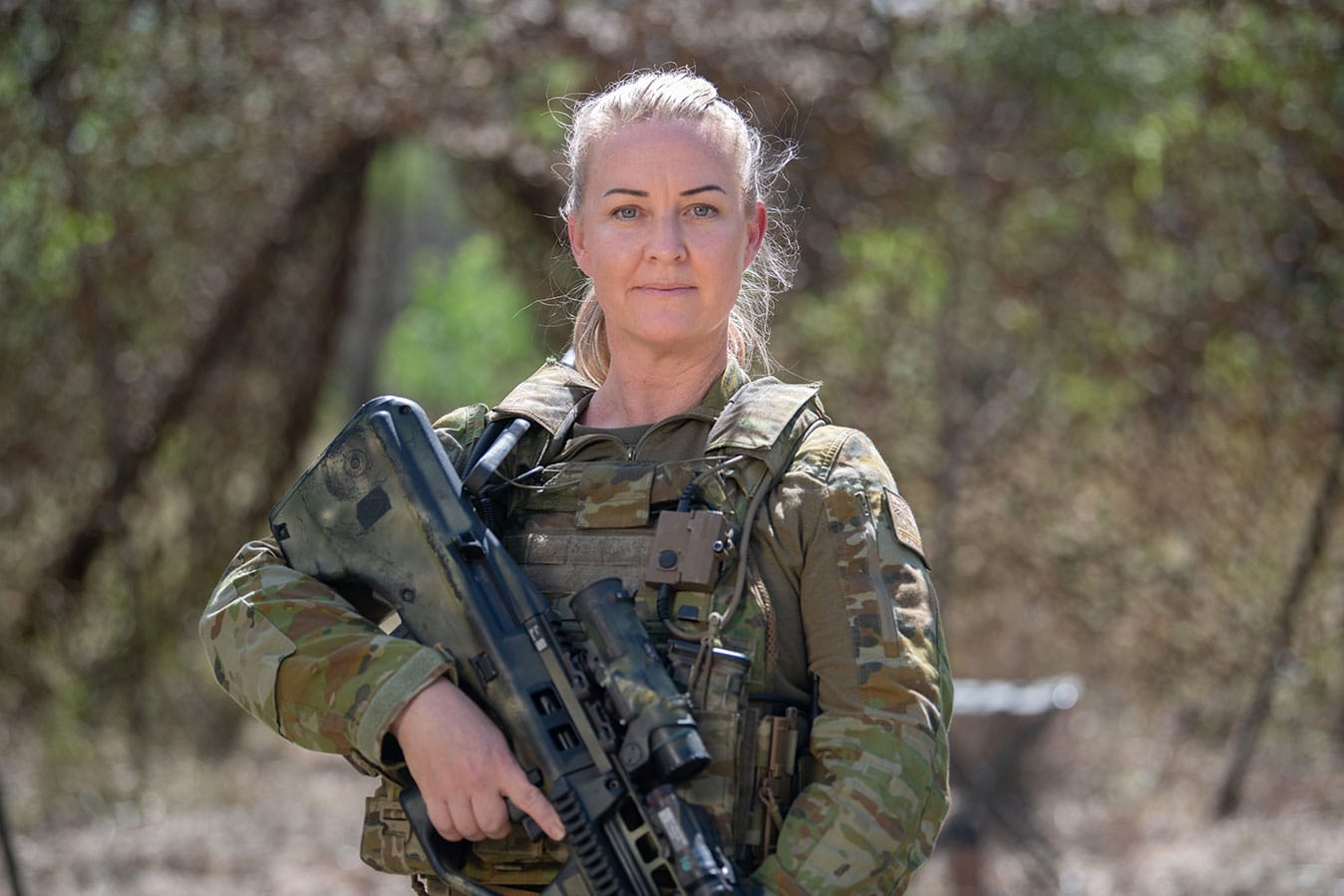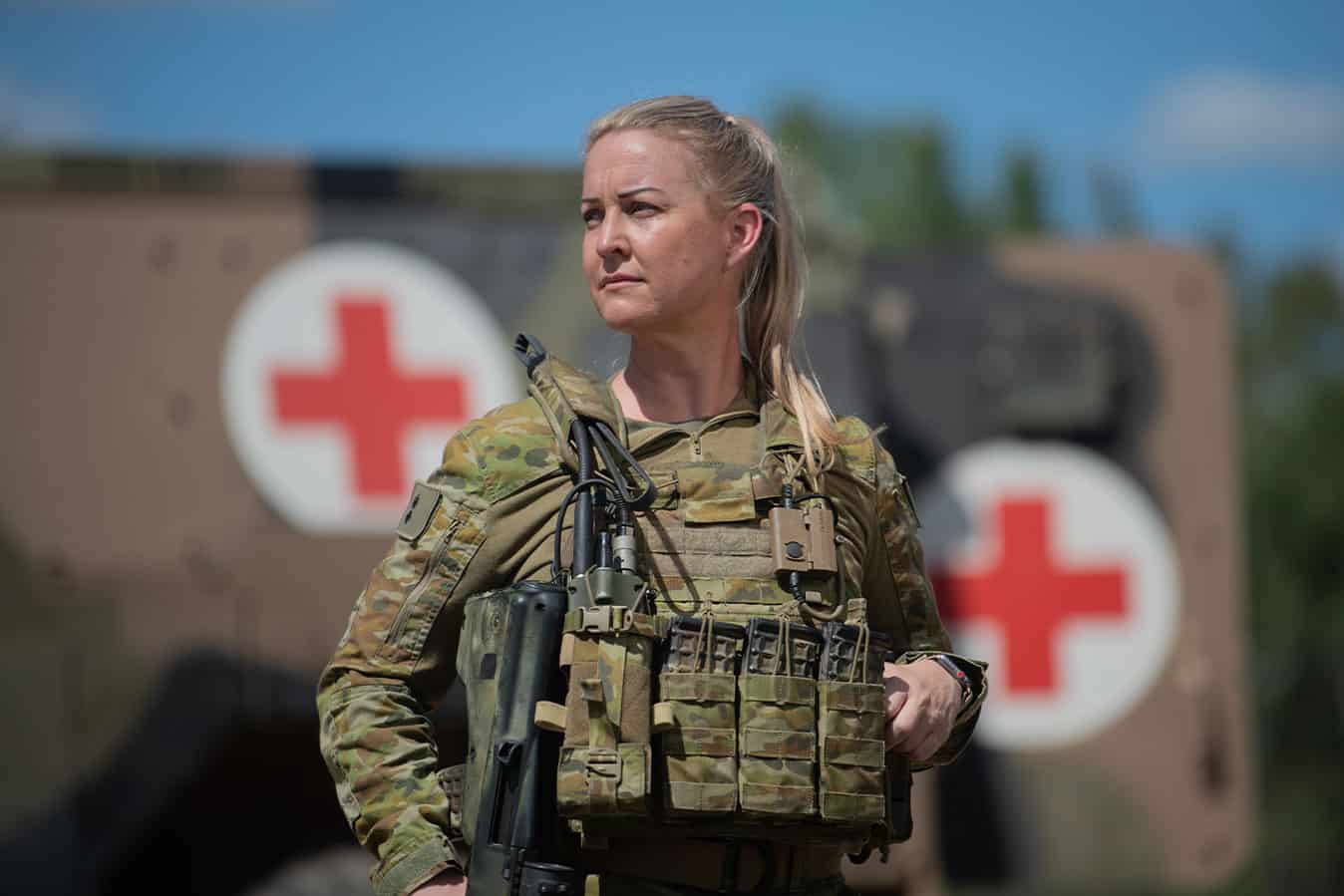Kylie Hasse was studying nursing at Queensland University of Technology (QUT), and waiting for a lecture to begin, when she heard that an Australian Defence Force recruitment talk would be delivered before commencement.
“I listened and thought – ‘why not?’ she recalls of the session.
Intrigued, Kylie joined up as a Reservist within the Army Medical Corps as a Preventative Medicine Technician. In this role, she worked on various exercises, including supporting the Melbourne Commonwealth Games in 2006.
“I then gained a passion for Defence and Army and decided I would plan on making the step into full-time work as a Nursing Officer,” explains Kylie.
“I made the transition in 2008, never looked back, and have been in the Army full-time since.”
To become a nurse with the Australian Army, applicants need a Bachelor of Nursing and a minimum two years’ clinical experience under their belt. The job offers a unique and diverse career, says Kylie.
During her 15-year stint, it has ranged from being a Regimental Nursing Officer for an Infantry Battalion, to managing a health centre with over 100 staff delivering health services to more than 6,000 soldiers, sailors and aviators.
“I was one of the key clinicians in the delivery of primary clinical care for the Battalion, as well as coordinating the clinical care and rehabilitation plans for the soldiers,” says Kylie.

“This also saw the direct delivery of care in an exercise setting. This looks like sitting out in the field, triaging and caring for the soldiers when they are injured or ill in the field. This is an austere environment, with minimal equipment and you need to be conscious of your surroundings and evacuation timelines in formulating clinical decisions.”
“Previous to my current role, I was a Health Centre Manager, overseeing clinicians, allied health services, mental health care, pharmacy, basic radiology and dental services in the delivery of health services to more than 6000 soldier, sailors and aviators.
“It was a challenging role, which I carried out in the height of COVID where we were also responsible for the delivery of hotel quarantine COVID testing to ADF run quarantine hotels. Subsequently my health service was then responsible for the delivery of the COVID vaccine rollout to all soldiers, sailors and aviators in South East Queensland.’
Currently, Kylie is Senior Health Officer in the 3rd Combat Brigade, managing its operational health effect and readiness, health and wellbeing, and family and community engagement.
To succeed as an Army Nurse, Kylie says you need to possess confidence, innovation and flexibility.
“Confidence in your practice skills, confidence to voice your opinion and advice. Innovation to problem solve complex and simple problems, and then flexibility to adapt to any given situation,” she explains.
It’s precisely those skills that enabled her to help lead deployments in Afghanistan, in 2012, where she was a trauma nurse and medical team leader in Tarin Kot, and later in Iraq, in 2014, as the lead health planner for health support, as well as the senior nurse officer for Special Operations Task Group, teaching emergency medicine to soldiers and newly arrived medics.
“Both these deployments have left an imprint on my life. Seeing the best and the worst of humans is a humbling and rewarding experience that is really difficult to put into words.”
Reflecting on her career, Kylie says the most memorable part has been the diversity of roles and the people she’s met along the way.
“I have been very fortunate and lucky to have meet and worked with some of the most fascinating and intelligent people. This has seen me now have lifelong friends from all over the world and teammates that are more like family. The people have made my experiences what they are and have widened my aperture to the world as a whole.
“What I love most is the diversity of my roles. I love that there is an opportunity to always step outside your comfort zone and challenge all of your senses, not just your clinical acumen. I love that you are part of a bigger team and the diversity of the people you work with lets you see problems and the world from many different perspectives. My career has taken me all over the world and has allowed me to integrate and form special relationships with people of many different nationalities.”
Next year, Kylie will take up command as the Commanding Officer of the 4th Health Battalion, achieving one of her career goals. It makes her feel proud that nurses like her remain an integral part of the Australian Army, and in diverse settings across the country.
“I think nursing in general is a role that over the past few years has begun to really showcase itself as a profession,” she suggests.
“Nurses are one of the most unsung heroes of the health profession. I think that if we continue to remind ourselves, first and foremost, of our role and how amazing our profession is, we can continue to represent nurses and show the public how incredible nurses are. Nurses sometimes are their biggest critics, and if we can have confidence in ourselves, then the world will continue to see the nursing profession for what it is; a highly capable, professional and formidable profession that has a lot to offer.”
For early career nurse and students looking to follow Kylie’s example, she suggests keeping your options option and trying anything and everything.
“My advice is that I am proof that just because you tried something once and it wasn’t the right thing for you doesn’t mean it wasn’t part of your journey to your destination. My second piece of advice is always say yes (within reason). Saying yes widens your aperture in your career and just because something presents itself as mundane, boring or too hard; sometimes these chances can produce the most rewarding experiences.
“As an Army nurse, there are some amazing opportunities that you can harness. From being able to work closely with our combat arms and deliver healthcare in some of the most austere, remote and complex environments; to being able to hone your specialty skills undertaking further post-graduate level studies. There are progression opportunities everywhere.”








